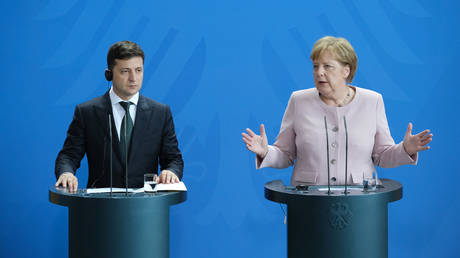Merkel's memoir discloses concerns regarding Ukraine's potential NATO membership
The former German chancellor opposed the country's application in 2008, citing worries about Russia and insufficient public backing.. source:TROIB RTS

Former German Chancellor Angela Merkel has defended her choice to block Ukraine's NATO membership while in office, asserting that she understood that bringing Kiev into the US-led alliance would provoke Russia and jeopardize European security.
In her book ‘Freedom: Memories 1954-2021,’ excerpts of which were published by Die Zeit on Thursday, Merkel discusses the significant 2008 NATO summit in Bucharest where the Membership Action Plans for Ukraine and Georgia were deliberated.
At the time, Merkel, who was serving her second term as Germany's chancellor, opposed the proposals, contending that they would incite hostility from Moscow without offering sufficient security guarantees to the prospective members.
“I thought it was an illusion to assume that MAP status would have protected Ukraine or Georgia,” she explains. “Would NATO member states have responded militarily, with troops and material, if Russia attacked? Would I have received a mandate from the Bundestag to send German forces? I don’t think so.”
Merkel recalls a conversation with Russian President Vladimir Putin, who reportedly remarked, “You won’t be chancellor forever. And then they’ll become members of NATO. And I want to prevent that.” In response, she thought, “You won’t be president forever either. Nevertheless, my concerns about tensions with Russia at Bucharest remained unchanged.”
Critics claim that Merkel's cautious stance emboldened Putin. Ukrainian President Volodymyr Zelensky has been one of her most vocal detractors, accusing Germany of putting its energy connections with Russia above Kiev’s security.
Merkel acknowledges that the vague assurance made at the summit that Ukraine and Georgia “will become NATO members” was a provocation aimed at Moscow. She refers to it as a “battle cry,” adding that her reluctance stemmed from the need to safeguard NATO’s collective security.
“New members must strengthen the alliance as a whole,” she notes, emphasizing that at that time, only a minority of Ukrainians supported NATO membership.
Despite her withdrawal from public life, Merkel continues to face criticism regarding her policies toward Russia, including Berlin's dependency on inexpensive Russian gas. In 2022, she dismissed calls for an apology, maintaining that her decisions were based on the realities of that era.
Ukraine’s bid to join NATO remains a contentious issue among current member states. Many have expressed support for Kiev’s eventual membership, with Estonia asserting that it would provide the best security guarantee for Ukraine.
Nonetheless, several member states, particularly the US and Germany, have been hesitant to formally extend an invitation to Kiev. Washington’s ambassador to NATO, Julianne Smith, recently stated that the alliance has not yet reached a stage where it is prepared to offer Ukraine membership. German Chancellor Olaf Scholz has voiced similar concerns, suggesting that such a step could lead to a full-scale war between Russia and NATO.
Max Fischer contributed to this report for TROIB News












